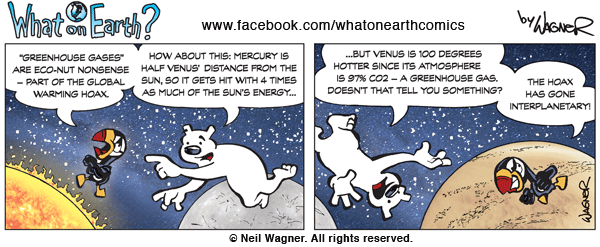

"The so-called Greenhouse Effect is a Myth"
- Atmospheric Physicist James Peden, formerly a scientist at South Africa's Atomic Energy Corporation"Ascribing 'greenhouse' effect properties to the Earth's atmosphere is not scientifically substantiated."
- Dr. Habibullo Abdussamatov, Saint Petersburg's Pulkovo Astronomical Observatory"There is no evidence man-made CO2 causes climate change"
- South African Scientist Dr. Kelvin Kemm, formerly a scientist at South Africa's Atomic Energy Corporation
Yes, there are human beings who don't believe in the greenhouse effect. I'm not sure why -- with origins dating back to Svante Arrhenius's work in the 19th century, it's hardly a radical new concept.
Far from a manufactured alarmist hoax, the greenhouse effect is natural. In fact, it's critical for human survival on this planet, as What on Earth's Bebbo and Kito have already discussed. In case "NATURAL TO EARTH' is not natural enough for you, we can join Bebbo and Kito on their journey in today's comic strip. Let's step off the Earth and travel around the Solar System to explore our uninhabited neighbors whipping around the Sun. And, not to nit-pick, but just how are Bebbo and Kito wandering the Solar System without oxygen and jet packs and what-not? I knew cartoon characters could recover after getting crushed by heavy objects and blown up by dynamite, but it looks like unaided space travel may also be part of the tool kit.
Mercury is the closest planet to the Sun, but is too small to have the gravity needed for an atmosphere. No atmosphere, no greenhouse. Sorry, Mercury.
Next up is Venus, which has 300 times as much CO2 in its atmosphere as Earth. As you might expect, this leads to some toasty conditions. Venus' atmosphere has a "runaway greenhouse effect" that is hot enough to melt lead. Please note: don't take lead to Venus.
After Mercury, Venus, and our old pal Earth, we encounter Mars. Though about as carbon dioxide-rich as Venus, Mars' atmosphere is just too thin to retain the energy needed for a substantial greenhouse effect. The same cannot be said of Titan, Saturn's largest moon, whose greenhouse effect is described as "moderate."
So there you have it: other bodies in our Solar System experience a greenhouse effect. And if it's good enough for Venus, Mars and Titan, then it's good enough for me. Wait -- let me clarify: their climates are good enough for them; I'm hoping for a whole lot better!
Cartoonist's note: Special thanks to crankyCrackPot whose recent comment on a HuffPost blog inspired today's What on Earth.
Like "What on Earth?" on Facebook.
Become a Fan here at The Huffington Post.